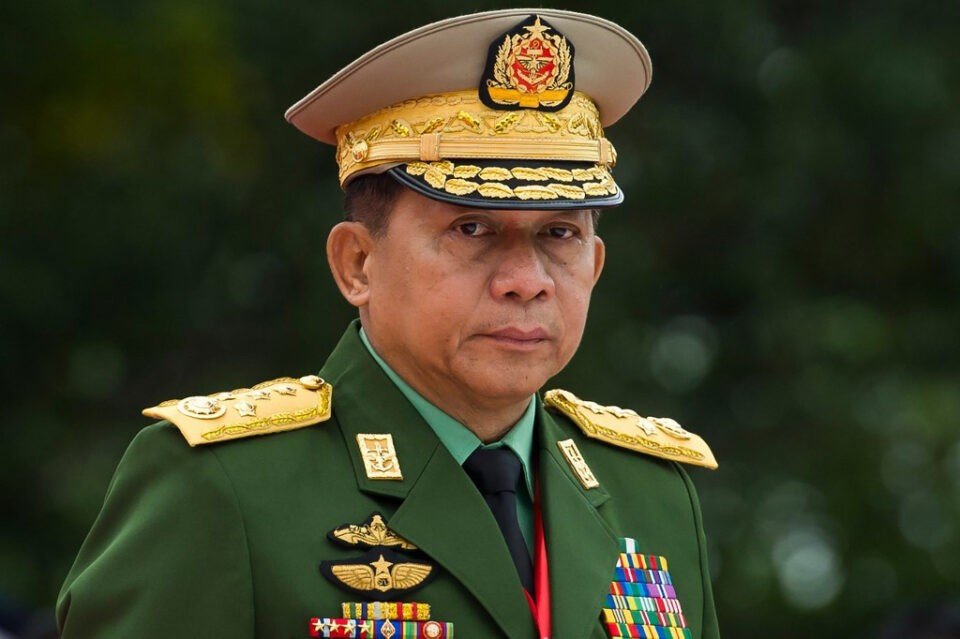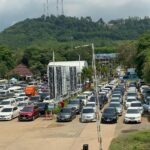When the soldiers first seized power on Feb 1, they said they would run the country for one year before holding elections.
More than 600 people have been killed and about 2,800 arrested since the junta took control.
The killings continued on Friday in Bago, near Yangon, where witnesses said at least 10 people were killed and their bodies piled up inside a pagoda after troops fired rifle grenades at anti-coup protesters.
Myanmar Now news and Mawkun, an online news magazine, said at least 20 people were killed and many wounded. It was not possible to get a precise number because troops had cordoned off the area near the pagoda, they said.
Junta spokesman Brig Gen Zaw Min Tun told a news conference in the capital, Nay Pyi Taw, that the country was returning to normal and government ministries and banks would resume full operations soon.
The country has ground to a standstill because of daily protests and widespread strikes against military rule.
“The reason of reducing protests is due to cooperation of people who want peace, which we value,” Zaw Min Tun said. “We request people to cooperate with security forces and help them.”
He said the military had recorded 248 deaths and he denied that automatic weapons had been used. Sixteen policemen had also been killed, he said.
Zaw Min Tun also accused members of deposed leader Aung San Suu Kyi’s National League for Democracy of arson and said the protest campaign was being financed by foreign money, but gave no details.
The Assistance Association for Political Prisoners (AAPP) activist group has said 614 people, including 48 children, had been killed by security forces as of Thursday evening.
“We are humbled by their courage and dignity,” a group of 18 ambassadors in Myanmar said of the protesters in a joint statement.
“We stand together to support the hopes and aspirations of all those who believe in a free, just, peaceful and democratic Myanmar. Violence has to stop, all political detainees must be released and democracy must be restored.”
The statement was signed by the ambassadors of the United States, Britain, the EU, Canada, Australia, New Zealand, South Korea, Switzerland and several other European nations.
“The suggestions from neighbouring countries and big countries and powerful people in politics, we respect them,” Zaw Min Tun said.
Zaw Min Tun said reports that some members of the international community did not recognise the military government were “fake news”.
“We are cooperating with foreign countries and working together with neighbouring countries,” he added.
Ousted Myanmar lawmakers urged the United Nations Security Council on Friday to take action against the military.
“Our people are ready to pay any cost to get back their rights and freedom,” said Zin Mar Aung, who has been appointed acting foreign minister for a group of ousted lawmakers. She urged Council members to apply both direct and indirect pressure on the junta.
“Myanmar stands at the brink of state failure, of state collapse,” Richard Horsey, a senior adviser on Myanmar with the International Crisis Group, told the informal UN meeting, the first public discussion of Myanmar by council members.
The UN special envoy for Myanmar, Christine Schraner Burgener, had wanted to visit the country but said she has been rebuffed by the generals.
“I regret that Tatmadaw answered me yesterday that they are not ready to receive me,” Schraner Burgener said after arriving in Bangkok for the start of a regional tour to test the waters for a diplomatic push to help guide the country out of its crisis.
Nineteen people have been sentenced to death in Myanmar for killing an associate of an army captain in a district of Yangon, state media said.
Seventeen of the people were sentenced in absentia, the military-owned Myawaddy television station reported on Friday. They were the first such sentences announced in public since the Feb 1 coup.
The report said the killing took place in the North Okkalapa district of Myanmar’s biggest city.
Martial law has been declared in the district, allowing courts-martial to pronounce sentences.
The junta said on Friday that a protest campaign against its rule was dwindling because people wanted peace, and that it would hold elections within two years, the first timeframe it has given for a return to democracy.
When the soldiers first seized power on Feb 1, they said they would run the country for one year before holding elections.
More than 600 people have been killed and about 2,800 arrested since the junta took control.
The killings continued on Friday in Bago, near Yangon, where witnesses said at least 10 people were killed and their bodies piled up inside a pagoda after troops fired rifle grenades at anti-coup protesters.
Myanmar Now news and Mawkun, an online news magazine, said at least 20 people were killed and many wounded.
It was not possible to get a precise number because troops had cordoned off the area near the pagoda, they said.
Junta spokesman Brig Gen Zaw Min Tun told a news conference in the capital, Nay Pyi Taw, that the country was returning to normal and government ministries and banks would resume full operations soon.
The country has ground to a standstill because of daily protests and widespread strikes against military rule.
“The reason of reducing protests is due to cooperation of people who want peace, which we value,” Zaw Min Tun said. “We request people to cooperate with security forces and help them.”
He said the military had recorded 248 deaths and he denied that automatic weapons had been used. Sixteen policemen had also been killed, he said.
Zaw Min Tun also accused members of deposed leader Aung San Suu Kyi’s National League for Democracy of arson and said the protest campaign was being financed by foreign money, but gave no details.
The Assistance Association for Political Prisoners (AAPP) activist group has said 614 people, including 48 children, had been killed by security forces as of Thursday evening.
“We are humbled by their courage and dignity,” a group of 18 ambassadors in Myanmar said of the protesters in a joint statement.
“We stand together to support the hopes and aspirations of all those who believe in a free, just, peaceful and democratic Myanmar.
Violence has to stop, all political detainees must be released and democracy must be restored.”
The statement was signed by the ambassadors of the United States, Britain, the EU, Canada, Australia, New Zealand, South Korea, Switzerland and several other European nations.
“The suggestions from neighbouring countries and big countries and powerful people in politics, we respect them,” Zaw Min Tun said.
Zaw Min Tun said reports that some members of the international community did not recognise the military government were “fake news”.
“We are cooperating with foreign countries and working together with neighbouring countries,” he added.
Ousted Myanmar lawmakers urged the United Nations Security Council on Friday to take action against the military.
“Our people are ready to pay any cost to get back their rights and freedom,” said Zin Mar Aung, who has been appointed acting foreign minister for a group of ousted lawmakers.
She urged Council members to apply both direct and indirect pressure on the junta.
“Myanmar stands at the brink of state failure, of state collapse,” Richard Horsey, a senior adviser on Myanmar with the International Crisis Group, told the informal UN meeting, the first public discussion of Myanmar by council members.
The UN special envoy for Myanmar, Christine Schraner Burgener, had wanted to visit the country but said she has been rebuffed by the generals.
“I regret that Tatmadaw answered me yesterday that they are not ready to receive me,” Schraner Burgener said after arriving in Bangkok for the start of a regional tour to test the waters for a diplomatic push to help guide the country out of its crisis.




